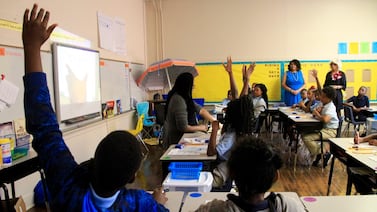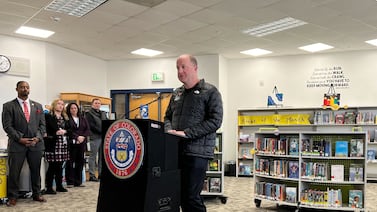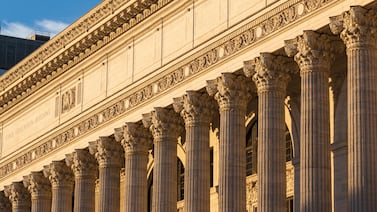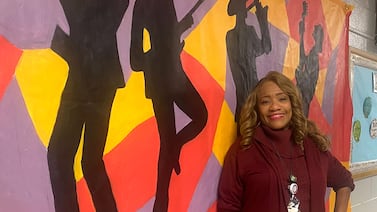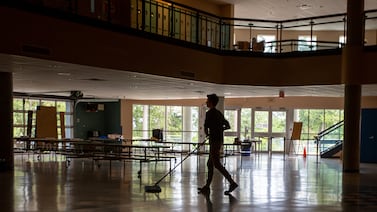Sign up for Chalkbeat Philadelphia’s free newsletter to keep up with news on the city’s public school system.
There are days when Patricia Houston comes home exhausted and emotionally drained from her job as Director of Children’s Community School, a nonprofit preschool and early childhood education center in a racially diverse but rapidly gentrifying neighborhood of West Philadelphia.
Then, she’ll reach into her pocket and find … a random piece of cheese. And the stress melts away.
“Every day you go home with some weird stuff in your pocket,” Houston said. “There are so many rewards and so much magic in it.”
Houston has been working in the early childhood and early intervention field for some 27 years at different schools and in different roles. She’s been a babysitter, nanny, teacher, assistant director, and now a director. She approaches her job with a focus on nurturing children’s social-emotional development.
Paying attention to that social-emotional development has taken on a new urgency in recent weeks. Houston said her school community comprises many LGBTQ+ families who are watching the new Trump administration attempt to remake education to reflect conservative values and target anything under the umbrella of diversity, equity, and inclusion.
For Houston, maintaining her school as a safe haven for her students became paramount.
Post-COVID, Houston said a lot of her fellow educators and even the school’s leadership were burnt out and wanted to leave the field. Houston briefly considered stepping away herself but then she got asked to consider staying on as the new director.
“I didn’t say absolutely. I was hesitant,” Houston said.
If she had it her way, Houston would be an anthropologist, traveling around the world to study how different cultures nurture their children. But these days, she’s found there’s a lot to learn in her own backyard.
As a Black woman serving a mostly white student body, Houston said, “It’s actually felt somewhat empowering to be in a community where we could have these conversations,” about race and equity in a way that is productive and not “shame-y,” she said.
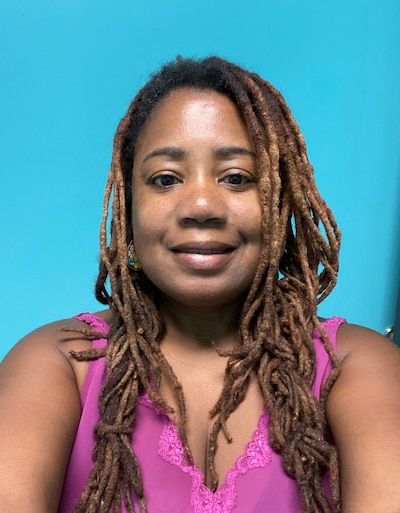
And she is endlessly inspired by the educators around her who are also working to build a stable home in a rapidly changing society.
“How invested the teachers are is something that is really rare, and it’s really special,” she said. “It’s really powerful to see that in action. That’s what kept me here.”
This interview has been lightly edited for length and clarity.
What has your experience been like as a director of a school?
I never in my life thought about being a director of a school. I just love working with kids and being in the classroom and playing with them and engaging them.
The school was in a transitional phase following COVID. This has been pretty typical in [early childhood education], where a lot of a lot of veterans in the field said “Oh, I’m going to go explore somewhere else a little bit.” COVID was a big burnout for a lot of people. One thing that motivated me to stay during that turnover period was how important it is to keep quality preschools open, to build and empower educators to be inspired to fight for this basic right of children to have access to safe havens that offer quality care.
Part of what also motivated me to stay is that it was something familiar. I grew up in a very large family, and my parents died when I was younger, and so from the time I was a teen, I was co-raising my siblings with my other siblings. My siblings are doing so great now, so I know that there’s an outcome [for all kids], and it’s far away, but it’s not so far.
How is your school community doing? Especially in light of the Trump administration’s executive orders targeting “gender ideology” and any school subjects they deem “woke.”
I just have this really strong belief in this community. Everybody’s been working together, putting their resources together. I think it’s a really beautiful thing.
[The executive orders] are on our minds. We’ve talked about it loosely as far as what the next steps might be to protect the space for children and families. We’ve already begun making steps to plan to ensure everyone’s safety. I think it is something else that’s motivating each of us to push harder to make sure that our space is stabilized so that no matter what happens, we can keep coming together as a community.
Some things that we have done that are going to help with this are creating more clear channels of communication in the school, working together as a team to do a lot of reparative and [restorative] work, just making sure we’re mentally prepared, and we have plans in place. There’s only so much we can control.
The school’s neighborhood in West Philly is also rapidly gentrifying. What have conversations been like about how the community is changing?
The school is predominantly white, and we’re trying to diversify. It’s interesting because we have a school around the corner that’s predominantly Black, and they’re working on diversifying the opposite way.
Myself and their director, we’ve met and have tentatively planned some events where we’re sharing a yard together, or the kids from here are going on a field trip to their school and vice versa.
I’m not sure if this is specific to West Philly, but I think that it is something that has a West Philly vibe, is that some of the parenting styles are a little bit more permissive, free, and less structured, in a sense. The children are given more autonomy.
What’s been interesting about it, and how it links to social-emotional development, is that for some of these children, when they’re coming into school, I notice “Oh, this child is actually seeking some boundaries.” I’ve observed that many of the children need a bit more scaffolding to understand how to be in community with others. So we try to keep our classrooms more free and open and play-based, but also recognize we need to set a firm boundary there. That is why their behavior is escalating, because they need to know, this is where you can stop. There’s a balance of what each of those children need, and we try to keep both of those worlds available in the same classroom.
Have you noticed behavioral changes since COVID? We’ve heard many pandemic babies and toddlers are having a hard time adjusting to social settings.
Most of the children need a lot more social-emotional support than pre-COVID. There’s a lot more anxiety behaviors. Children are going to feed off of the energy of what’s around them.
We do work really hard to make sure we’re noticing how kids are internalizing the world around them and any events that are happening. We’ll send out information to the families saying, “So this event just happened, and this is how you can talk about this with your child.”
When Trump was elected, some people were not happy about that. And so some kids were like, “Now, a bad guy is running our country?” And so having conversations with the kids about, well, what is a bad guy? Explaining that nobody’s really a bad guy, but people can make decisions where they’re not thinking about others.
We say there’s a lot of people who are going to protest, and they’re going to say, “We don’t like that decision that you made. We have a different idea. Listen to our different idea.” And the person might listen or they might not. We just try to break things down to their level. We want to make sure that they don’t think that they’re living in an unsafe world.
During COVID, we talked about so many things with the kids about what was going on in the world, and helping them internalize it. It’s a lot that they’re taking in, and it is forming how they’re thinking about the world.
What brings you joy during turbulent times?
I’m an outdoor person. I love to be outdoors. I hike a lot. I go on hiking and camping trips quite often. I always spend time in nature. I hula hoop. And I reflect a lot. I always think it’s important to be aware of the emotional tolls of what you’re doing and to be able to name them and realize what the origin of some of the stress is and come up with a plan for how you’re going to navigate it. And really knowing what my values are and what I’m grounded in.
The work is so rewarding, and to me, it feels like the most important work in the world. I do focus on that. When you help a child through a very complex behavior or challenging behavior, you’re guiding a kid through something to get an outcome, and then seeing that outcome and the rewards that it has for the child and the family and a child’s social interactions with their peers. There’s just something so great about that because I know that that is going to help change their life forever. As an ECE teacher, you don’t see the kids when they’re grown up. You don’t always know the impact that you might have had on a child.
There’s so much magic in this field. If you’re taking little kids on walks, or you’re going outside with them as a grownup, you rediscover the world every day. You’re constantly reminded as you’re showing it to them, like, this is amazing. This is cool. That is awesome, how the clouds are doing that.
Is there anything you would change or improve about the early childhood space?
One thing in this field is that you don’t really get paid much, and that is a huge emotional toll. I remember a long time ago, having a workshop through school where somebody came in and said, “You don’t get paid a lot in this field, and here’s some ways that you can budget your money, and here’s some tips to help you.” And I think that’s something that would be helpful for early childhood educators to have a little bit more of.
There’s been times throughout the years where financially, I’m like, this is just not sustainable. But my heart is just in it. I just know it’s my purpose to be in this field.
Carly Sitrin is the bureau chief for Chalkbeat Philadelphia. Contact Carly at csitrin@chalkbeat.org.

